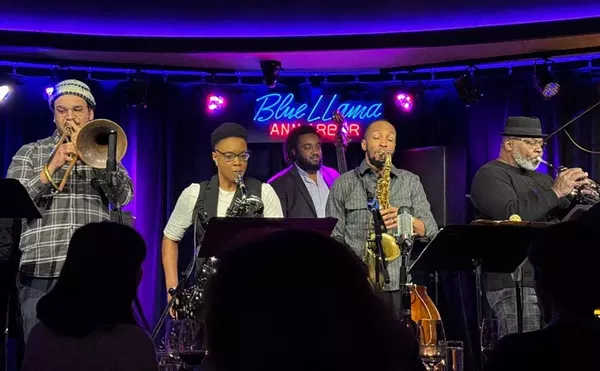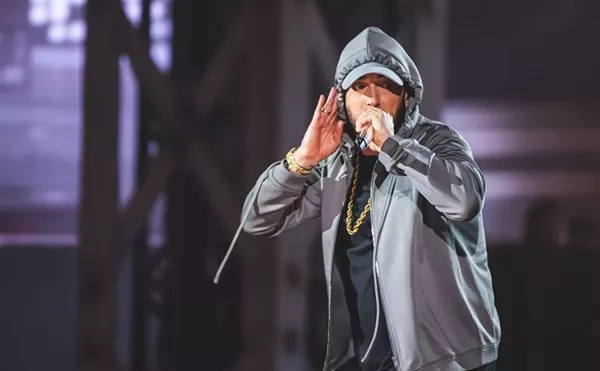After Andy Warhol and Roy Lichtenstein made it interesting and sexy, not (heaven forbid) intellectual, to look at painting again -- after Miles Davis rock 'n' rollified jazz with Bitches Brew and Live-Evil, making it possible to shake one's moneymaker to dense improvisation (again) -- after Robert Altman helped Hollywood catch on to those European cinema ways, saving the "made in America" label from total humiliation -- after those culture moves of the '60s and early '70s, somebody had to help challenging classical music get over to the young folks, and it wasn't going to be Leonard Bernstein with West Side Story.
In fact, the process had already started all on its own with the provocative redefinitions -- both acoustic and electronic -- that John Cage had been proposing since way back in the '40s. Cage made "classical" music brand-new, while Robert Ashley -- of Ann Arbor's renowned Once group -- rethought opera as a fresh experience of the senses, just as Glenn Branca's guitar armies would soon take the schmutzig stain off the word "symphony" for thousands of young listeners.
But if we're looking for a legitimate contender when it comes to popularizing the new music repertoire, bringing works by Henryk Górecki, Sofia Gubaidulina and Kevin Volans to the larger audiences they deserve, the nomination is obvious: the Kronos Quartet. Formed in 1973 by violinist David Harrington -- after he heard a performance of George Crumb's string quartet, "Black Angels," on the radio -- this ensemble has opened the doors to the present for whole generations of music lovers.
By the time the other longtime members had signed on -- John Sherba, violin; Hank Dutt, viola; Joan Jeanrenaud, cello -- it was 1978. Punk had exploded and, with it, a boatload of misconceptions about sound. All kinds of limitations to composing, combining and enjoying music were tumbling down. Even the puritanical severity of American avant-garde regulations were up for grabs. Kronos, like the Talking Heads, its punk counterparts, steered New Wave sensibilities down exhilarating paths. The quartet's legendary performances of Jimi Hendrix's "Purple Haze," and arrangements of Willie Dixon, James Brown, Muddy Waters and Thelonious Monk simply brought down the house wherever they occurred. Soon young mods and turks began flocking to the concerts.
And in the wake of this popularity, a venerable, intellectual, passionate form of composition -- the string quartet -- was given new life in this country. Recordings of contemporary ensembles flourished: Some, like the Arditti Quartet, were simply breathtaking in their virtuosity and commitment to new ideas; others, like the Turtle Island Quartet, took the idea of popularization to familiar lows.
But Kronos had its own agenda, which focused -- and still does -- on commissioning new works from the best composers far and wide (John Adams, Philip Glass, Arvo Pärt, Astor Piazzolla, Steve Reich, et al.), a heaping selection of which is included on 25 Years, the quartet's amazing, 10-CD anniversary set. The late Morton Feldman, an early Kronos associate and one of the 20th century's most original voices, is represented by the sublime Piano and String Quartet, a stellar recording with pianist Aki Takahashi. Russian composer Alfred Schnittke's Quartet No. 2 cascades with Bartok-like passion and a distinctly Eastern European sense of space. And Argentinean Osvaldo Golijov's "The Dreams and Prayers of Isaac the Blind" -- with David Krakauer on clarinet -- becomes a deeply moving elegy for our times.
What's ironic, and telling, in this mammoth release is that Kronos' populist projects, like the best-selling Pieces of Africa, are not represented. Instead, we have here a Kronos Quartet that, for 10 discs, just rocks its deeply felt, serious involvement in the most thrilling new music it can find.






